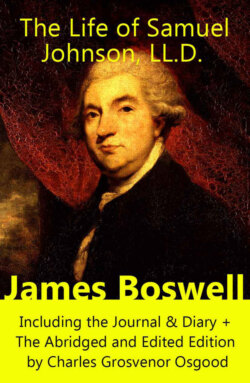Читать книгу The Life of Samuel Johnson, LL.D. - James Boswell - Страница 34
На сайте Литреса книга снята с продажи.
JOHNSON.
ОглавлениеThe particulars which Oldham has collected, both as exhibiting the horrours of London, and of the times, contrasted with better days, are different from those of Johnson, and in general well chosen, and well exprest[343].
There are, in Oldham’s imitation, many prosaick verses and bad rhymes, and his poem sets out with a strange inadvertent blunder:
‘Tho’ much concern’d to leave my dear old friend, I must, however, his design commend Of fixing in the country—.’
[Page 120: The publication of London. A.D. 1738.]
It is plain he was not going to leave his friend; his friend was going to leave him. A young lady at once corrected this with good critical sagacity, to
‘Tho’ much concern’d to lose my dear old friend.’
There is one passage in the original, better transfused by Oldham than by Johnson:
‘Nil habet infelix paupertas durius in se,
Quàm quod ridiculos homines facit;’
which is an exquisite remark on the galling meanness and contempt annexed to poverty: JOHNSON’S imitation is,
‘Of all the griefs that harass the distrest,
Sure the most bitter is a scornful jest.’
OLDHAM’S, though less elegant, is more just:
‘Nothing in poverty so ill is borne,
As its exposing men to grinning scorn.’
Where, or in what manner this poem was composed, I am sorry that I neglected to ascertain with precision, from Johnson’s own authority. He has marked upon his corrected copy of the first edition of it, ‘Written in 1738;’ and, as it was published in the month of May in that year, it is evident that much time was not employed in preparing it for the press. The history of its publication I am enabled to give in a very satisfactory manner; and judging from myself, and many of my friends, I trust that it will not be uninteresting to my readers.
[Page 121: Johnson’s letters to Cave. Ætat 29.]
We may be certain, though it is not expressly named in the following letters to Mr. Cave, in 1738, that they all relate to it:
‘To MR. CAVE.
‘Castle-street, Wednesday Morning. [No date. 1738.]
